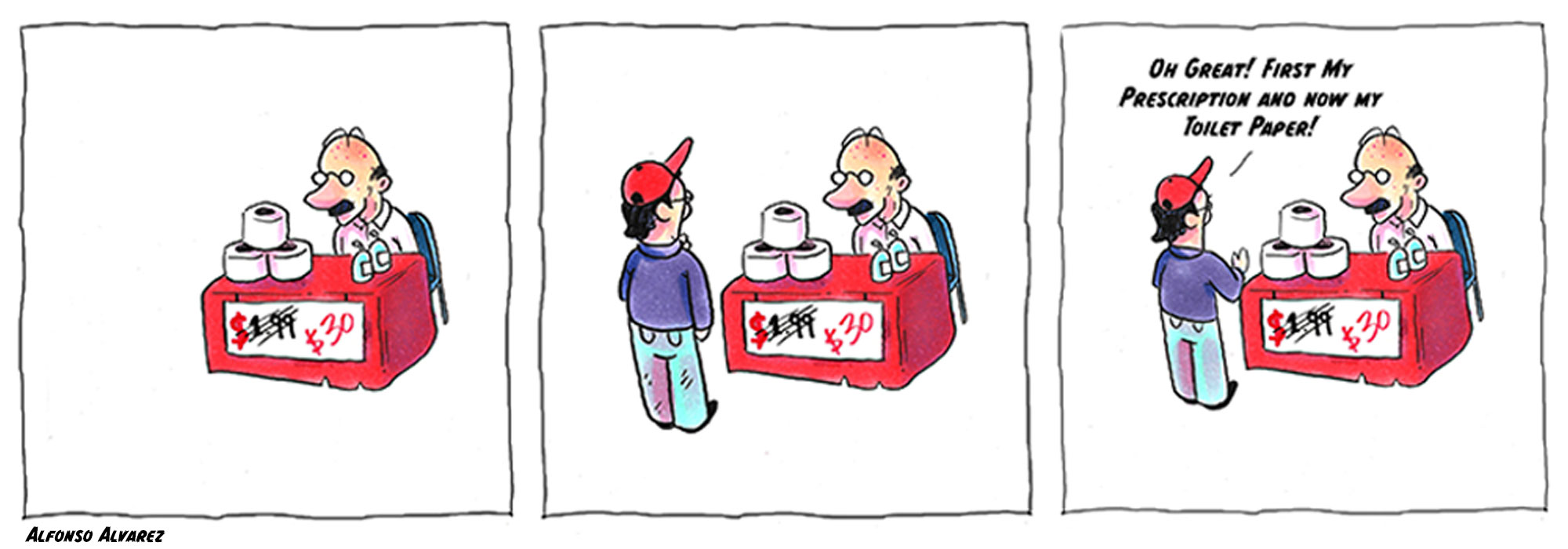
COMMENTARY: In a pandemic, opportunism is not entrepreneurship

The COVID-19 outbreak is something that has overtaken every part of our daily lives and while many of us are adjusting to the temporary new normal, others are taking advantage by engaging in price gouging.
Price gouging is when a seller increases the price of basic goods, such as toilet paper or bottled water, to a level that is much higher than what is fair and is highly unethical.
By engaging in price gouging, sellers are taking advantage of people in a time of crisis. While some may see this as entrepreneurship – using basic supply and demand economics – there is no valid excuse or reasoning for this unethical and opportunistic behavior.
COVID-19 is not the first time price gouging has become a hot topic in the news, with instances occurring during the wake of nearly every natural disaster such as stores in Texas selling cases of bottled water for $99 during Hurricane Harvey.
Reports of recent price gouging across America have skyrocketed since the COVID-19 outbreak, with instances emerging shortly after the World Health Organization declared a pandemic on March 11. As of March 27, the Attorney General Office reports there have been over three thousand filed complaints of price gouging just in the state of Texas.
The Texas Attorney General’s office issued a statement on March 13 warning of the consequences of price gouging: a fine up to $10,000 with additional fines up to $250,000 if the victim is elderly. The statement also provided a hotline that citizens can call to report instances of price gouging.
While the warning can be seen as beneficial, there is an underlying issue with the Texas Attorney General statement in that there is no clear legal definition of price gouging. It also generally falls under the umbrella of “I know it when I see it,” which leads to complications.
The statement issued by the Attorney General’s office defines price gouging as “selling or leasing fuel, food, medicine, lodging, building materials, construction tools, or another necessity at an exorbitant or excessive price” and “demanding an exorbitant or excessive price in connection with the sale or lease of fuel, food, medicine, lodging, building materials, construction tools, or another necessity.” It also states that high prices do not necessarily reflect price gouging and businesses are allowed to determine the price of their goods.
Another issue with enforcing price gouging laws is there really is not a way to enforce the law unless an instance of price gouging has been reported, and by the time legal action has been taken, someone might have already fallen victim and paid an exorbitant amount of money for something as basic as a gallon of milk.
Even reputable online retailers like Amazon have had instances of price gouging with third party dealers selling a pack of 320 Lysol disinfecting wipes for $220 for an item that usually costs roughly $15.
To combat this, Amazon has restricted sales of items like toilet paper and hand sanitizer from third-party sellers. Other issues of price gouging arise when people purchase items in bulk in hopes of selling them at an increased price to make a profit during a time of global emergency, such as when two brothers from Tennessee purchased nearly 18,000 bottles of hand sanitizer with intentions of selling them at inflated rates.
The brothers, who sold nearly 300 bottles from anywhere between $8 and $70 during the early days of March, professed to believe they were doing something noble by helping those in need. The brothers have since been banned from Amazon and eBay, and are now resorting to donating their stockpile to hospitals and homeless shelters following immense backlash on social media, once reports of the brother’s nefarious dealings surfaced online.
To prevent instances like this from occurring, grocery store chains have begun placing purchasing limits on items that are most popular. HEB is limiting the purchase of items like toilet paper, meat, milk, bottled water, and hand sanitizer.
While this is a good start, it still has not stopped customers from lining up outside store doors over an hour before the store opens. Because of this, by midday to early afternoon stores are wiped out of most of those items and customers who missed out will have to try the next day.
Price gouging, while unethical, is still sadly going to occur as there are just too many people that see this crisis as an opportunity to make money by taking advantage of those in need. Any instances of price gouging should be immediately reported to your local authorities so proper action can be taken and these immoral people can be held accountable.
